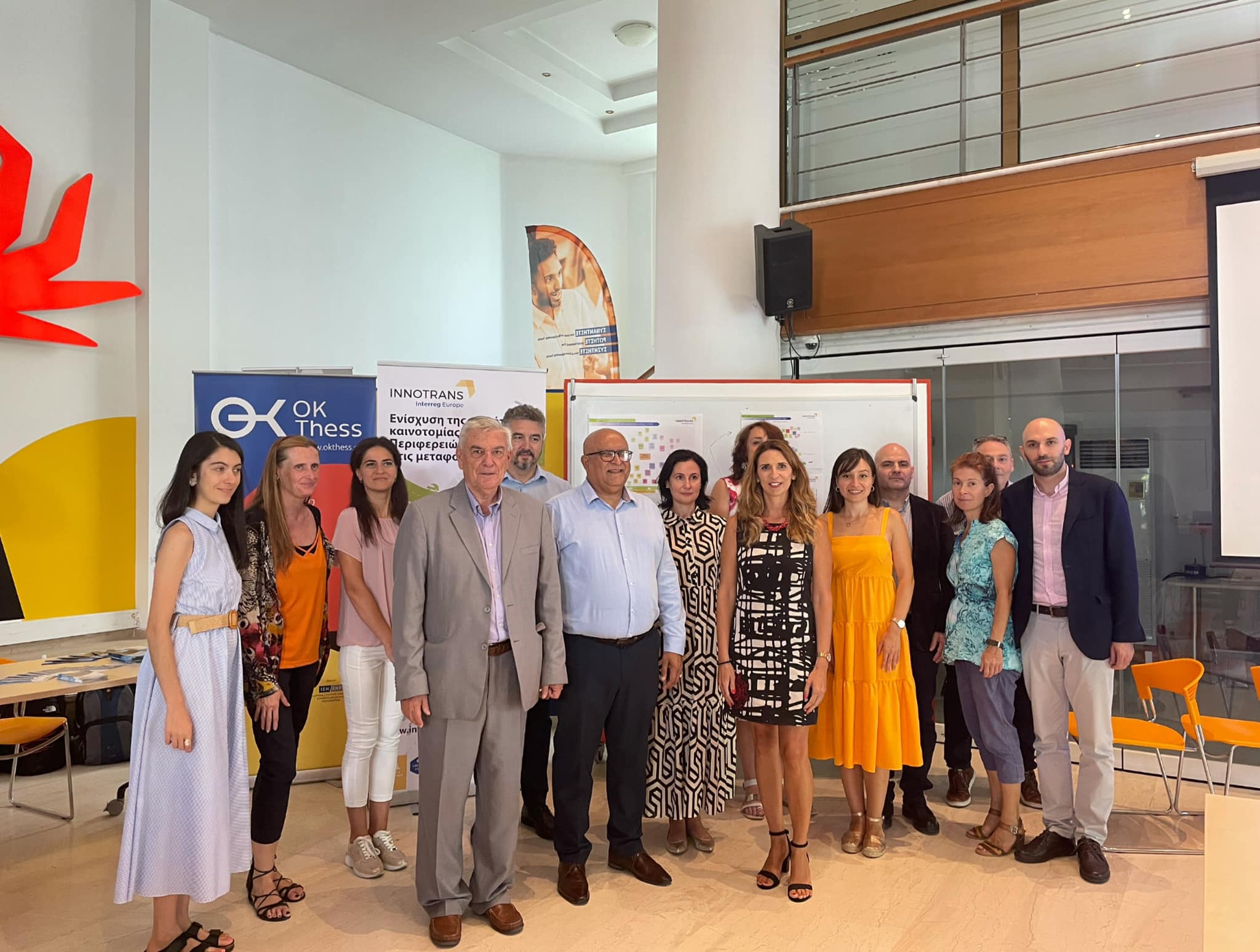
COVID19 Inter-regional workshop
The final inter-regional workshop of INNOTRANS project took place on the 29th August in Thessaloniki!
INNOTRANS will map regional transport innovation capacity and identify the competitive advantage of the regions. It will develop guidelines for policy interventions and Action Plans. It will also explore the regional innovation potential and make recommendations on how to support weak regions. The project will ultimately contribute to the building of a regional culture of continuous innovation that minimizes innovation risks and maximizes its returns.
The outputs of the INNOTRANS project aim to help regions interested in focusing on transport innovation, in terms of providing a solid knowledge base for taking more informed decisions.
It concentrates on:
€1,077,201.00
Research and innovation
INNOTRANS will aim to improve or change current measures in support of transport innovation public funding schemes as key element of transport innovation infrastructure, taking into consideration the current picture of the innovative milieu in the regions. The Actions Plans, which will derive from the project, will suggest schemes for the support of transport innovation in the regional Growth an Jobs programmes.
The ultimate goal of the project is to assist regions in creating a funding strategy that builds upon existing and potential areas of competitive advantage, avoiding fragmentation and linking the assets in new and different ways.
The Operational Programme (OP) highlights the strength of the West Midlands region (UK) in Advanced Manufacturing and Engineering, especially motor vehicles, engineering activities and other transport equipment. At the same time it does state 3 main disadvantages:
The primary aim of Theme 1 is to improve the conditions for research and development, in particular with the aim of raising combined public and private investment levels in this sector to 3% of GDP. The interventions suggested under Theme 1 include support for research, development and innovation in high-value manufacturing including low carbon vehicles and intelligent mobility. The actions that will be supported are:
The OP though needs to be improved in terms of incorporating new actions and also focusing on new areas (e.g. transport services where West Midlands is very weak at). Further more, the Programme should channel the funding only towards infrastructure & capacity building projects that have major impact.
Under Priority 1, the focus is on promoting business investment in R&D by developing links and synergies between businesses, research and development centres and higher education. It relates to:
Action 1.1.4 is particularly addressed at supporting collaborative R&D for the development of new sustainable technologies as well as new products and services, realized by companies in connection with the industry, research and academia and with already existing public-private partnerships such as Technology Districts and Innovation Poles.
Additionally, the action is also aimed at promoting the development of means and innovative systems for sustainable mobility, tuneable from intermodal point of view, in order to increase the competitiveness of existing businesses and management in full respect of the environment and natural resources.
However, further actions need to be taken to ensure the involvement of all stakeholders and beneficiaries in the definition of the regional strategies. It is necessary to be sure that eligible projects correspond to regional needs. In fact, the priority and targets need to be clarified and practical solutions need to be introduced from other European regions in order to ensure the best value for the region.
The Operational Programme is conceived as a multi-fund programme with interventions supported from ESF and ERDF. Under priority 1, it supports R&I in the following areas:
In accordance with the smart specialisation strategy, aeronautics, transport equipment and motor vehicles are seen as priority sectors.
Under Priority 2, the Operational Programme supports actions that relate to innovative urban public transport use such as P+R (park & ride) facilities and sustainable mobility in general.
The OP needs to be enriched with innovative and smart solutions to meet the actual needs in accordance with the new Prague Strategic Plan. Involving both priority axes in the project will enable to reflect the transport innovation in the Programme, encourage joint development and investment in innovative transport infrastructure and capacities. Sharing the knowledge and good practice from partners shall bring the new perspective into the current state.
Under Priority 1, Research and Innovation, the proposed interventions aim to determine major changes in terms of changing the structure of the RDI activities that rely on traditional industries characterized by outdated technologies and a weak demand for knowledge results. It should ensure that technology flows and knowledge impact in areas with the greatest potential for growth. Further more, it should mobilize innovative SMEs that have the necessary motivation and capacity to enter into regional chains of added value.
Support of innovation and technology transfer entities in the areas of smart specialization is one of the key areas of focus. One of the main domains of smart specialisation is transport; specifically,the automotive industry, transport equipment and ship-building. The need for a more sustainable transport system based on co-modality is recognised under Priorities 3 & 4.
According to the JASPERS/ARUP report (2013) and the smart specialisation expert group, transport sector has a huge potential but currently the public funding and private investment is very low while the transport innovation infrastructure and capacities projects are general. INNOTRANS is expected to provide directions how to reflect the need for integrating transport specific measures and funding for RTD.
The Regional Operational Programme 2014 – 2020 of the Region of Western Macedonia (RWM) contributes towards achieving Europe 2020 targets for smart, sustainable and inclusive growth aiming to boost economic development, create jobs and help authorities and institutions to become more competitive and innovation driven. RWM aims to achieve these goals through developing the regional innovation smart specialization strategy and managing actions under the Programme.
INNOTRANS project will contribute to ROP’s Priority Axis 1: “Strengthening research, technological development and innovation” and Priority Axis 7: “Promoting sustainable transport and removing bottlenecks in key network infrastructures”. The need for intelligent transport is included in the recommendations of experts in the use of ICT by the transport sector, according to the EU study “RIS3 Regional Approach: Western Macedonia”. Transportation is a cross sector development variable: not only investing in infrastructure but also in innovation. Until today the main focus of the policy instrument has been towards infrastructure and not promoting transport innovation actions, although the region is in urgent need of innovative solutions.
ROP aims to boost economic development and create job opportunities in Central Macedonia Region (RCM). It contributes to achieving the “Europe 2020 targets” for smart, sustainable and inclusive growth, also in line with the smart specialisation strategy RIS3. It should create jobs and help SMEs to become more competitive and innovation-driven. INNOTRANS project will contribute to ROP’s Thematic Priority 1:"Strengthening research, technological development and innovation" and Thematic Priority 7:“Promoting sustainable transport and improving network infrastructures”. According to the preliminary strategic directions of the Region, one of the sectors that is best suited to benefit from modern ICT tools and technologies is the transport sector and in specific: “the cost and time lost on transport for citizens and enterprises is enormous; modern smart transportation approaches, based on ICT, should be deployed, to minimise the cost of travelling, reduce the consumption of fossil fuels, and improve the efficiency of businesses”. The ROP needs to be enriched with the concept of transport innovation, encouraging joint development and implementation of investments in innovative transport infrastructure and capacities. Transport is a cross-sector development variable and as such must be treated not only by investing in infrastructure but also in innovation. Up until today, main focus of policy instrument is towards infrastructure rather than promotion of transport innovation actions.

The final inter-regional workshop of INNOTRANS project took place on the 29th August in Thessaloniki!

The final interregional event of the additional activities of the INNOTRANS project due to COVID-19, will be realized on Monday 29th of August 2022 at 10.30 am
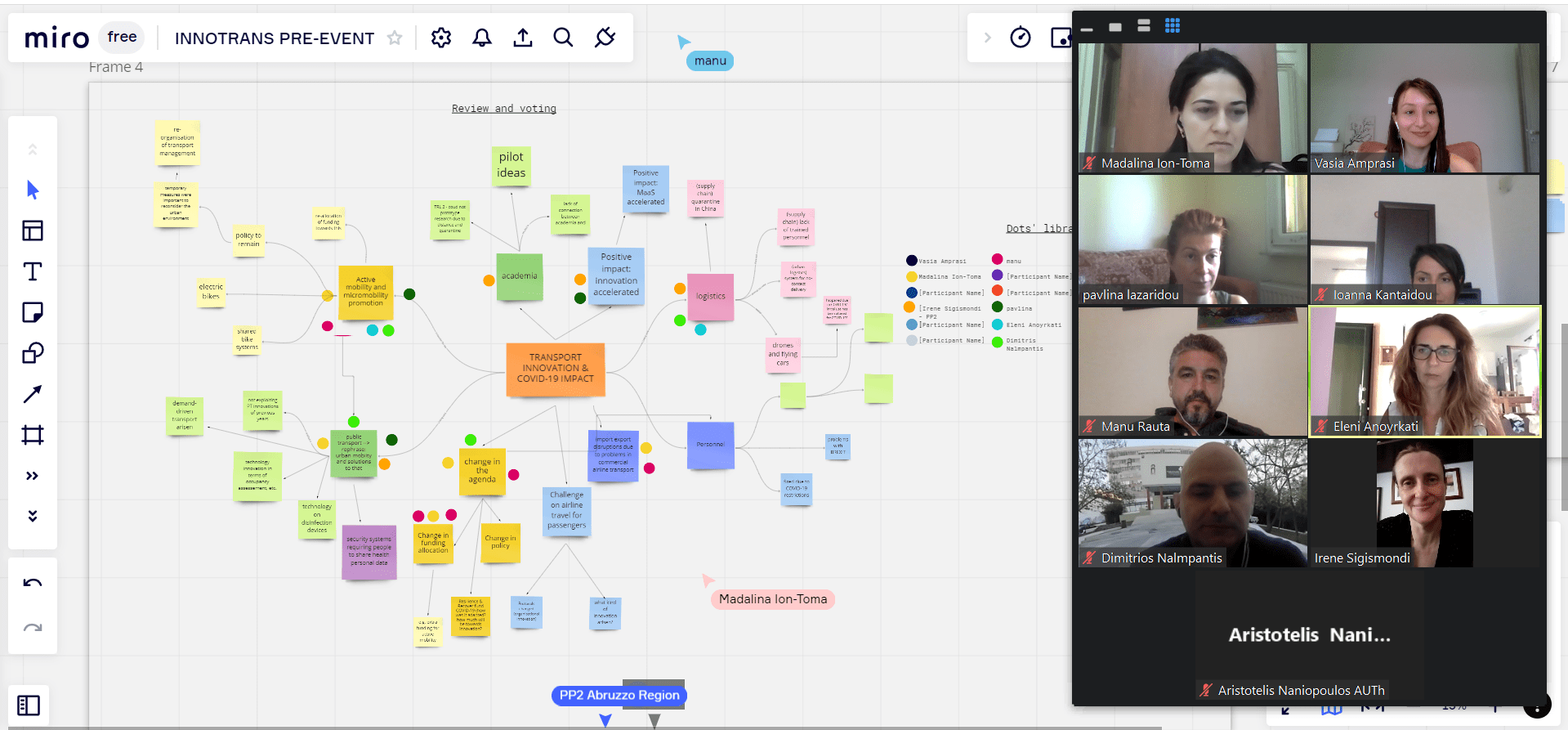
The INNOTRANS interregional workshop was realized virtually today, 7th of July 2022
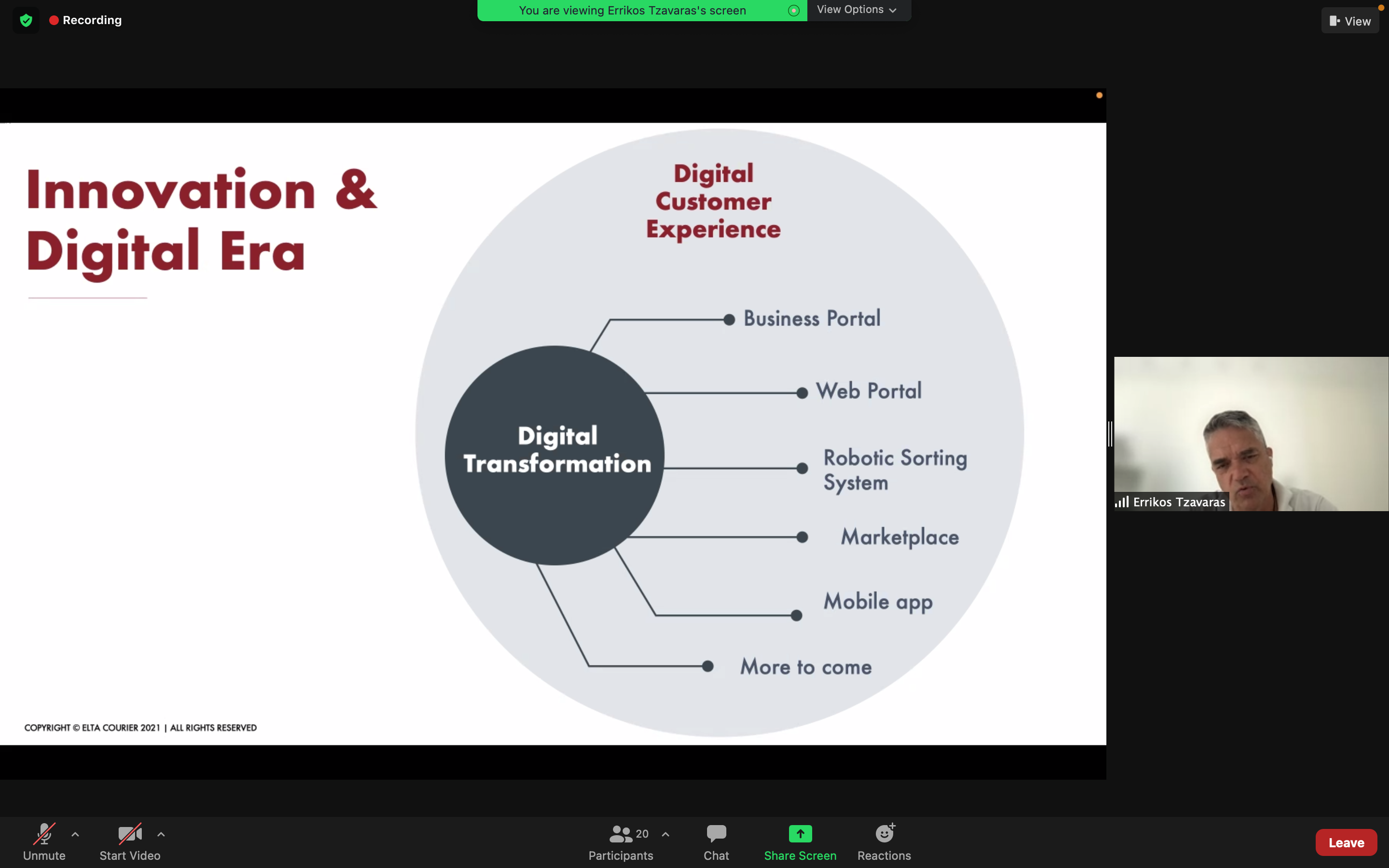
A very interesting study visit was hosted by our Greek partner, Aristotle University of Thessaloniki!

A successful and vivid local stakeholder meeting was realized virtually in Greece on Friday 25th of February 2022, with 21 participants

The final project meeting of Phase 2 took place online on the 7th of December
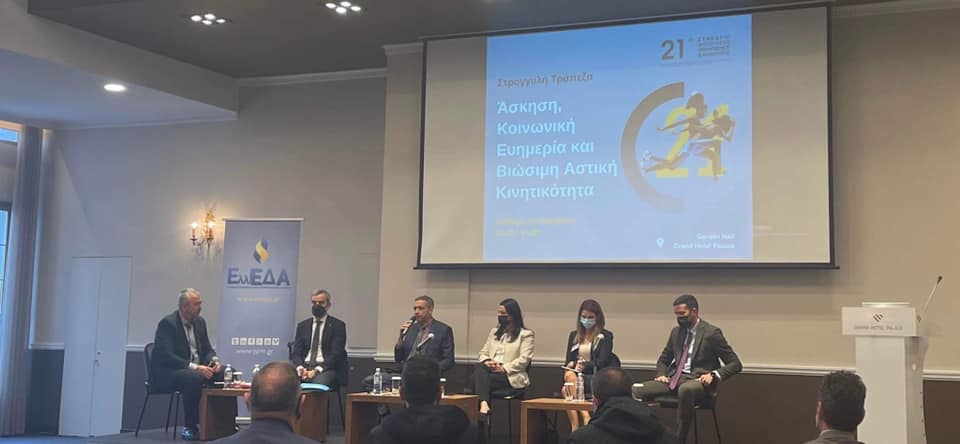
The INNOTRANS project was presented during the 21st Conference on Sport Management & Recreation during the round table discussion on Sustainable Urban Mobility
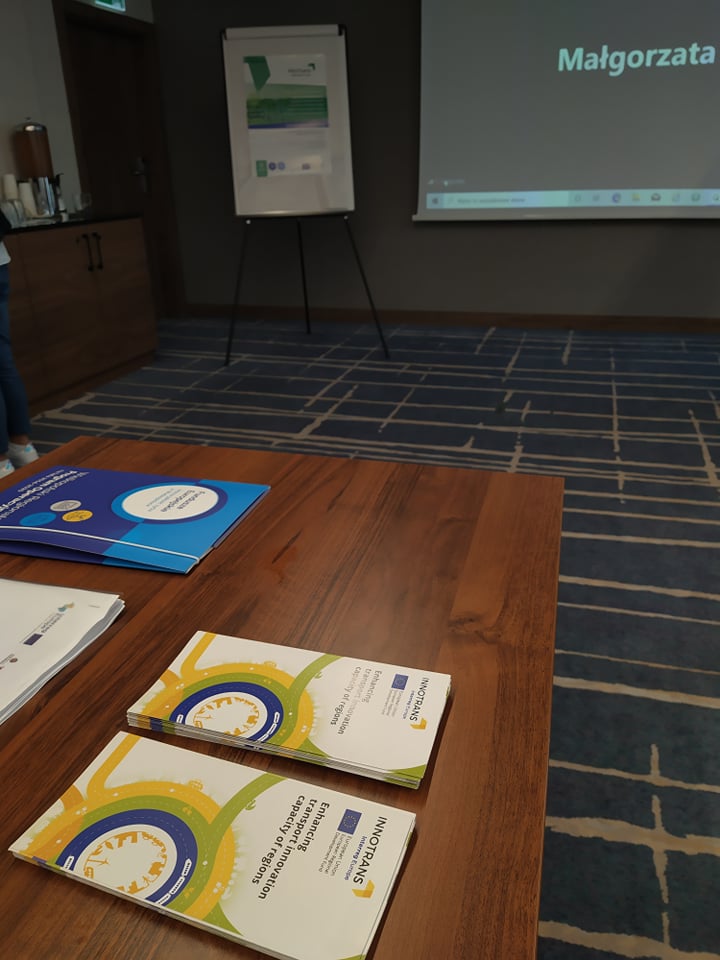
INNOTRANS travels in Kalisz, Poland to share Action Plan development experiences
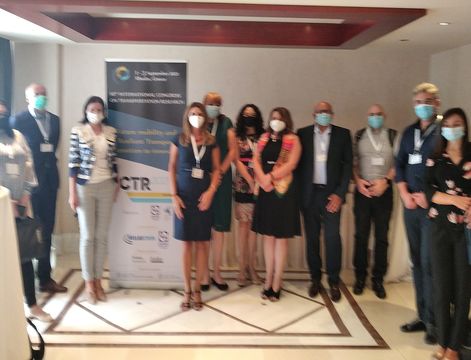
The INNOTRANS final conference took place on the 1st of September in Rhodes island, Greece

The Innotrans conference will also be online at https://zoom.us/j/96012840322?pwd=QjBvRUNLNzBORXk4Q0Q0Uk1zQlg3QT09